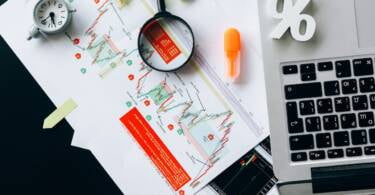Ending last year poorly was Russia’s economy. And, such is the linkage between headlines on the Russian economy and geopolitics, the news of Russia’s slump may have some worrying implications for 2015.
Russia’s Economy Contracts
A recent Reuters article highlighted that Russia’s GDP – broadly, the value of all goods and services produced within a country’s borders – contracted in November, for the first time since the financial crisis of 2008.
So, an economic contraction in Russia – that’s pretty much the same as everywhere else, right? Right, but there is also the not so trifling issue of Russia’s currency, the Ruble, losing value.
In December, the Ruble, Russia’s currency, nosedived (see image below). That is to say, the Ruble lost value relative to other currencies. What this means at the level of consumption is that goods become relatively more expensive for the average consumer. And, more broadly, high price inflation is a stumbling block for an already stuttering economy such as Russia.

source: CNN Money
Economists developed a portmanteau to describe a scenario where an economy is contracting – in terms of GDP – while prices simultaneously increase – or inflation. That term is stagflation. Indeed, 2015 could be a year of stagflation for Russia.
Instability in the Ruble has also provoked a reaction from foreign companies operating in Russia. Apple, the American retailer has stopped online sales in Russia, as reported by Bloomberg.
From the point of view of retailers, currency fluctuations are a pain in the backside. As the Ruble loses value against the dollar that means it costs more Rubles to purchase items than it did before – ceteris paribus, all other things held equal. Accordingly, as the Ruble loses value, retailers must change their prices to account for the loss in value of the Ruble. This is a cost to the retailers, and a convenient way of thinking about inflation is by thinking of it as a tax. Additionally, economists have colloquially referred to the costs of inflation as ‘Shoe Leather costs.’
This rather evocative imagery – for economists – conjures up the wearing-down of shoe leather of traders and consumers constantly going out to withdraw money, change their prices etc.
The Forces Working Against Russia’s Economy
Two major forces are working against the Russian economy: the fall in the price of oil (see chart below), and the sanctions placed against the country as a result of Russian annexation of Crimea.
So, even before the slide in the Ruble, the Russian Central Bank predicted a contraction in the Russian economy in 2015. This is perhaps evidence of the impacts of the Western trade sanctions. It is also perhaps a response to the slump in oil prices.
As Business Editor Kirstie Keate has previously written in Kettle, Russia largely depends on revenues from oil for its economic growth. As the slide in the price of oil shows no sign of abating, this is indeed a sticky situation for Russia to be in.
Various commentators have offered the view that Russia’s dip, breeding a recession will feel a lot like 2008, and may even feel like 1998, which resulted in Russia defaulting on its debt and revaluing its currency.
What is in store for Russia in 2015?
Interestingly the geopolitical implications of Russia’s slump echo the polarising language of the Cold War. East vs. West, enemies and friends and all that. Bloomberg News reported China may extend its hand to Russia should it need assistance. This would mark an unprecedented use of China’s currency to bail out another country. It would also seem like a very conclusive step in solidifying the East vs. West battle-lines.
In the macroeconomics of the Russia situation, The Economist has written it predicts Russia’s debt situation to worsen. It reckons the combination of the Russian Central Bank’s already downbeat forecasts for 2015, inflation hovering over 9% and the possibility of Russian government debt being downgraded to junk status as a trinity of pressures.
So, with 2015, we may see Russia’s economy in stagflation. If the price of oil stays lower than $100-a-barrel, the pressure will mount on the Kremlin, as the living standards of Russians will decline. So, will Putin ease his aggression at Russian borders?
Joseph Weisenthal of Bloomberg reported that Putin’s annexation of Ukraine was one of the most popular acts of his reign, and does not see any U-turn on this in spite of sanctions. The Spectator at the end of November wrote a prescient leader evoking images of the Cold War. In the leader, they offered the view that Putin may feel pushed towards further acts of aggression by the sanctions in the West upon realising that his Empire was better closed-off from the West anyway. Rather than encouraging peace at Russia’s frontiers, the logic goes, the sanctions may well break peace.
I’ve spoken to a two of my old housemates, one is Lithuanian the other is Latvian. I asked both of them if they have read or heard anything in their respective countries that raise fear about potential Russian aggression. From both of these guys I heard a similar story: one of the reasons the Baltic states sped-up integration with EU/Nato was based on security and that there have been fears of invasion ever since the annexation of Crimea.
This also made me think about something I read on the Foreign Affairs website by Anton Barbashin and Hannah Thoburn. The crux of what they were saying is this: Putin came to power with a Russia with no central idea – it had shed its skin of Bolshevism and Westernisation. As Putin emerged as a figurehead so too did the Russian idea of Eurasianism.
The authors hypothesis that Eurasianists stressed the uniqueness of Russian civilisation and its corresponding mission. That is, the authors offer, to create a centre of power and culture that combines traits of Europe and Asia, and for Russia to be its exemplar. Similarly, and perhaps more importantly, at the heart of this ideology is expansionism.
This all should give us pause to think. It certainly is enough to give us a chill.









